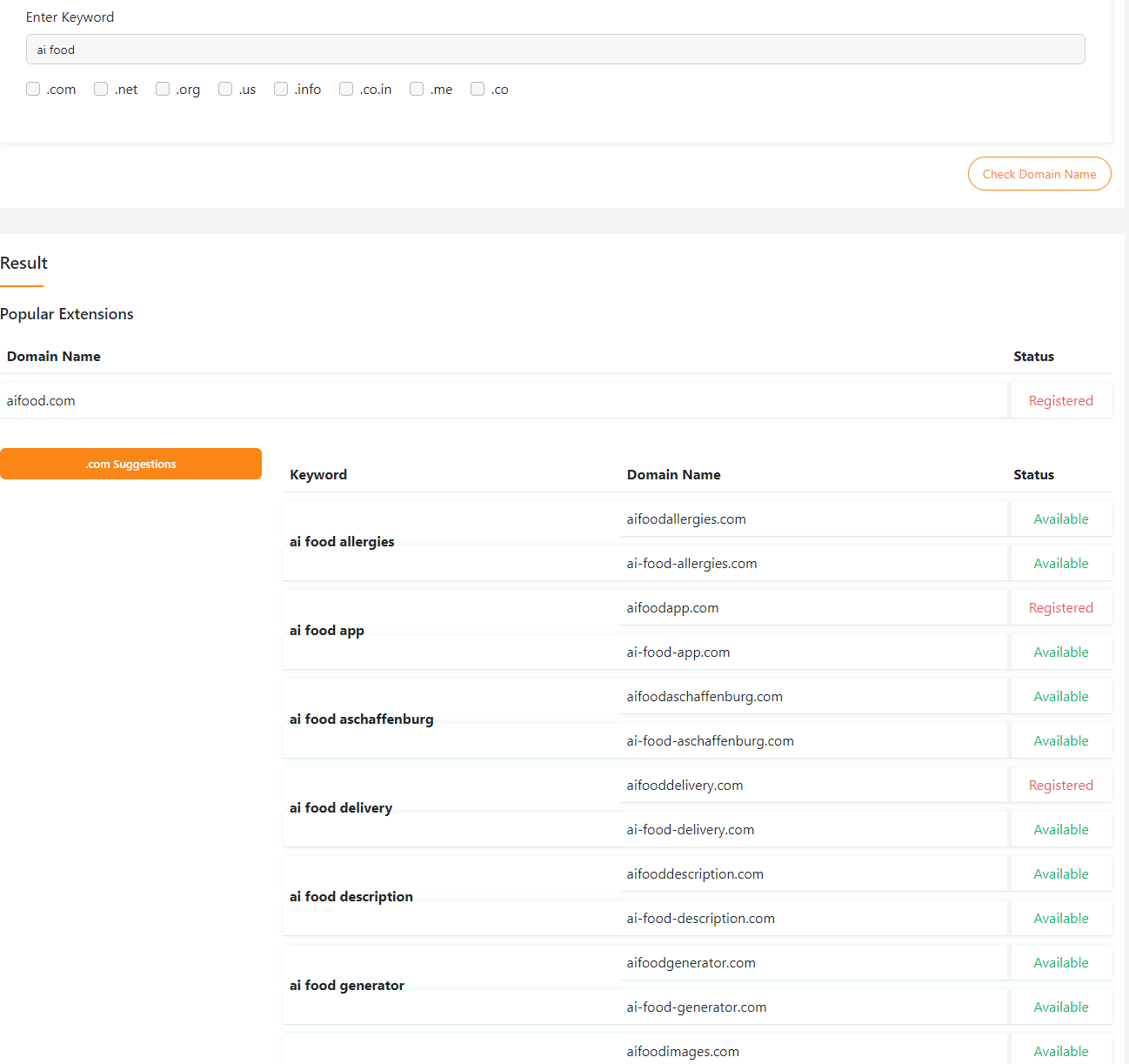Keywords Rich Domains
The Keywords Rich Domains tool helps you find domain names that include valuable keywords, enhancing your SEO strategy and online visibility. This tool is perfect for entrepreneurs, website owners, and marketers who need to select domain names that are optimized for search engines and easy to remember. The process is straightforward, providing a list of available domains that incorporate your target keywords.
Share on Social Media:
Maximizing SEO: The Real Impact of Keyword Rich Domains
Keyword rich domains have long been thought to boost SEO, but with search engines constantly evolving, where do they stand now? We’ll cut through the noise and give you an informed look at whether these domains help your website rank better, how to balance them with a strong brand identity, and the latest insights from search engine experts like Google’s John Mueller, who has stated that there is no ranking benefit associated with having keywords in a domain name. Dive in to make an educated decision for your online presence.
Key Takeaways
Keyword-rich domains contain keywords that align with businesses or services, but their effectiveness in improving search engine rankings, as posited by traditional views, has been challenged by experts like Google’s John Mueller.
While keywords in domain names can potentially increase visibility and traffic, balancing their use with maintaining a unique and memorable brand identity is vital for long-term success and differentiation in the market.
SEO strategies should be comprehensive, including keyword research and content quality, and must adapt to changes in search engine algorithms and practices, such as the incorporation of AI and evolving user behavior.
Exact match domain names, which include keywords from the search query, used to be highly valued in SEO for improving click-through rates and search rankings. However, Google updated its algorithm in 2012 to penalize low-quality websites with exact match domain names, reducing their significance in SEO. High-quality content is now a more important factor for SEO success.
Unlocking the Potential of Keyword Rich Domains

As the name suggests, a keyword-rich domain contains keywords that reflect a business, its products, or services, offering an initial hint to both users and search engines about a website’s content. Traditionally, such domain names have been highly valued for their role in improving search engine rankings as they align with search queries, attracting targeted traffic. Incorporating keywords in domain name can further enhance this effect.
Keyword-rich domains were once considered a significant ranking factor, believed to positively influence a website's search engine rankings. However, in the ever-evolving landscape of SEO, it’s essential to consider various perspectives. For instance, Google’s John Mueller has challenged the traditional view, stating that a keyword in a domain name does not increase a site's relevancy for searches containing that keyword. This has ignited an intriguing debate about the significance of keyword-rich domains in SEO, a topic we invite you to explore with us.
The Mechanics Behind Keyword Rich Domain Names
Let’s start with the basics. How do keyword-rich domain names work? It’s simple. If a user enters a search query that includes at least one of the keywords in your domain name, they are more likely to click on your website. This is because the presence of relevant keywords in your domain name signals to the user that your website is likely to contain the information they’re seeking.
Further, having domain names that include relevant keywords can enhance your website’s visibility in search engine results. This increased visibility can potentially lead to higher click-through rates, driving more traffic to your website. It’s a straightforward yet effective mechanism, provided that the keywords used are relevant and reflect your website’s content accurately.
Exact match domain names, which include keywords from the search query, used to be highly valued in SEO for improving click-through rates and search rankings. However, Google updated its algorithm in 2012 to penalize low-quality websites with exact match domain names, reducing their significance in SEO. High-quality content is now a more important factor for SEO success.
Keyword Rich vs. Branded Domains
With the mechanics behind keyword-rich domains established, it’s time to delve deeper. As much as keyword-rich domains can enhance SEO, it’s crucial to consider their interplay with branded domains. A unique and brandable domain name often proves more beneficial for building long-term customer relationships and business growth. This is due to their ability to create a distinctive market presence that aids in being memorable to customers.
On the other hand, while keyword-rich domains can be useful for SEO, they may face challenges in standing out among the competition due to a lack of uniqueness. Domains based solely on generic keywords may suffer in customer loyalty and retention as they can easily be confused with similar competitive domain names. Thus, it’s clear that a balance needs to be struck between incorporating keywords and maintaining a unique brand identity.
Navigating the SEO Benefits of Keywords in Your Domain

Now that we’ve established the groundwork, let’s navigate through the SEO benefits of having keywords in your domain. Despite the common belief, the inclusion of keywords in top-level domains (TLDs) does not automatically offer a ranking benefit, as stated by Google's John Mueller. While having a keyword in your domain can contribute to SEO, it is only considered a small factor in overall search ranking.
However, this doesn’t imply that keywords in domain names are entirely redundant. Quite the contrary, they can enhance a website’s visibility in search results by providing clear indicators of the content and services offered. The value of keywords in domain names persists, provided they are relevant and not over-stuffed, and they contribute to the overall branding.
Aligning Keywords With High Quality Content
While keywords play a significant role in SEO, their true potential shines when paired with high-quality content. Incorporating relevant keywords into high-quality content not only improves visibility in search engine results but also drives more organic traffic to the site. This combination of keywords and quality content can greatly enhance a website’s online visibility and attract more traffic.
The trick is to ensure that your keywords align with your content. The keywords in your domain name should indicate what your website is about, and the content on your website should deliver on that promise. In doing so, you create a consistent and trustworthy user experience that search engines reward.
Beyond the Domain: Comprehensive SEO Strategies
While domains are important, they are just one part of a comprehensive SEO strategy. Keywords in domain names are just one ranking factor among many and should be part of a comprehensive SEO strategy. True SEO success integrates:
Keyword research
On-page optimization
Backlink building
Shareable content
To enhance a website’s visibility and organic traffic, creating a high-quality blog post is essential. The evolution of search engine optimization practices, like Google’s algorithm changes, have placed more emphasis on content quality and less on keyword repetition.
The introduction of AI and chatbots in search, the emergence of Answer Engine Optimization (AEO), and the focus on mobile responsiveness all suggest that domains should adapt their SEO strategies to remain visible in an evolving landscape,[2.2_3],[2.2_4]]. Furthermore, SEO is not a one-time effort but requires ongoing monitoring, content updates, and adjustment to maintain search engine rankings, which are essential aspects of seo efforts and search.
The Keyword Rich Domain Suggestion Tool

To aid users in identifying suitable keyword-rich domain names, PagesTools.com offers the Keyword Rich Domain Suggestion Tool. This tool generates a list of available domain names based on the user’s input of specific keywords and checks their availability against the domain name registry, ensuring that the suggested domains are unique.
It is a valuable resource in finding the best possible keyword-rich domains to cater to your SEO needs, not only for Google but also for other search engines.
How to Use the Suggestion Tool Effectively
So, how can you use the Keyword Rich Domain Suggestion Tool effectively? The process is quite straightforward:
Start by entering your target keywords.
Select your desired domain extensions.
Once you’ve done this, the suggestion tool generates a list of domain suggestions that you can review and choose from.
What makes this tool particularly useful is that it provides information about the availability of the suggested domain names. This allows you to immediately see which options are free to register, saving you time and effort in your search for the perfect domain name. Thus, the tool simplifies the process of finding a keyword-rich domain name by providing you with a list of viable options at your fingertips.
Crafting the Perfect Keyword Rich Domain Name
![]()
Now, let’s delve into the art of crafting the perfect keyword-rich domain name. An effective domain name can serve as a powerful marketing tool, reinforcing your brand’s identity and enhancing your online presence.
The first step in crafting a keyword-rich domain name involves brainstorming relevant words or phrases associated with your products or services. This can be achieved through creative writing techniques, such as uninterrupted writing for set periods, to yield a diverse pool of potential keywords.
Keyword Research Fundamentals
To apply these potential keywords effectively, a solid understanding of keyword research fundamentals is crucial. Keyword research tools are essential for determining the most relevant keywords that could be used in a domain name to optimize search engine ranking. These tools rank keywords by search volume, cost-per-click, and competition, aiding in the strategic selection of keywords for domain name optimization.
An effective way to apply this knowledge is to brainstorm a list of words related to your product or service and combine them in different ways to create appealing domain names. Some examples of words you could use are:
Creative
Tech
Solutions
Digital
Marketing
Design
Studio
Agency
Domain suggestion tools can then be used to categorize these ideas based on user input and check their availability.
Balancing Keywords and Brand Identity
While keyword research is a critical aspect of creating a keyword-rich domain name, it’s equally important to balance this with your brand identity. Keyword-rich domain names can appear unprofessional and create a negative brand perception if not carefully implemented. An effective domain name should be memorable, create a strong brand, and stand out against competitors.
The domain name must resonate with the brand’s identity, clearly conveying its personality, values, and what it offers to customers. Keywords should be integrated into the domain name only when they sound natural and enhance the brand’s message, using well-known extensions like .com or .org to boost credibility.
Myths and Facts About Keyword Domains Use
As we navigate the waters of keyword-rich domains, it’s essential to separate fact from fiction. A common myth is the association of keyword-rich domains with spam, stemming from past practices where spammers used these domains to manipulate search rankings. However, search engine algorithm updates, such as Google’s 2012 update, have significantly reduced the effectiveness of this practice.
Despite these changes, misconceptions persist. Here are some common SEO myths:
Exact match domains do not guarantee better rankings. Google’s 2012 update penalized low-quality websites with exact match domain names, reducing their significance in SEO.
Beliefs in specific keyword density, LSI keywords, or domain authority as direct ranking factors are inaccurate according to Google.
The effectiveness of content in SEO is predominantly determined by its relevance and comprehensive coverage of the topic, not by the frequency of publishing or the length of the content.
These myths highlight the importance of informed domain selection and underscore the need for proper keyword research. Remember, when it comes to domain names and keywords, it’s a case of “use them or lose them.”
The Evolution of Search Engines and Keyword Domains
The world of SEO and keyword domains has undergone a significant evolution over the years. Search engines initially favored directory-driven results, with sites like DMOZ playing a significant role in website classification. However, this changed with Google’s introduction of PageRank in the early 2000s, which assessed the prominence of websites based on the quantity and quality of external links.
Over time, search engines shifted their focus towards understanding the context and semantics of user queries, affecting the strategy behind keywords in domain names. The rise of zero-click searches and the growing preference for topical authority suggest that demonstrating expertise in a subject area may become more important than having exact-match keyword domains.
Adapting to Google's Algorithms
With the continuous evolution of search engines, it’s essential for keyword domain strategies to adapt. Google’s AI-powered Search Generative Experience (SGE), for instance, represents a new development in search technology. The integration of AI-generated content by Google’s SGE indicates a shift in the importance of keyword domains.
As AI becomes more integrated into search functionality, it may lead to changes in how Google’s algorithm evaluates the relevance of keyword domains. Google's John Mueller has highlighted that there is no ranking benefit associated with having keywords in a domain name, including in top-level domains (TLDs) or anywhere else in the URL. This suggests that the adaptation of keyword domain strategies may be necessary to stay aligned with the evolving priorities of Google’s search algorithms.
Strategic Considerations for Multiple Domain Names
While a single keyword-rich domain can significantly enhance your online presence, owning multiple domain names can bring additional benefits, as well as potential pitfalls. For instance, having multiple domains with the same content can hurt SEO due to duplicate content issues. However, this can be mitigated by using 301 redirects to channel traffic from multiple domains to a single primary web address.
Owning multiple domains can have several benefits, including:
Preventing competitors from acquiring them
Reducing customer frustration from domain misspellings
Boosting visibility for high-value keywords by offering double the presence in search results
However, it is important to note that purchasing multiple keyword domain names without proper keyword research can be a waste of resources and may not align with user search behavior.
Legal Aspects of Keyword Rich Domain Names
When selecting a domain name, checking for trademark infringement is a crucial step to ensure it aligns with the brand’s identity and is legally available. This is particularly important in light of domain squatting, a practice where individuals register domain names that capitalize on the goodwill of existing trademarks. Despite legal protections, domain squatting persists, making it harder to tackle these issues.
Fortunately, legal mechanisms such as the Anticybersquatting Consumer Protection Act (ACPA) offer trademark owners a way to combat bad faith domain registrations that are similar to their trademarks. High-profile cases against individuals squatting on domains related to Microsoft and Madonna, for instance, demonstrate the enforcement of trademark protections in domain disputes.
Leveraging Social Media with Keyword Rich Domains
![]()
In today’s interconnected digital world, leveraging social media with keyword-rich domains can be a powerful strategy for a cohesive brand identity and increased online visibility. A domain name that is also available as a social media handle can aid in brand consistency and make it easier for the audience to find and recognize the brand across different platforms.
A similar domain name and social media handles help create trust with customers, encouraging them to interact with the business. Having a domain name that matches social media handles and branding can improve the natural user journey and increase website traffic.
Therefore, understanding the preferred social media platforms of a target audience allows for a more focused and effective marketing strategy.
Summary
In conclusion, while keyword-rich domains can enhance SEO and improve online visibility, they represent just one facet of a comprehensive digital marketing strategy. Balancing keyword use with maintaining a strong brand identity, adapting to evolving search algorithms, and leveraging social media are all crucial considerations. The journey to mastering keyword-rich domains may be complex, but the rewards of increased online visibility and improved brand recognition make it a venture worth embarking on.
Frequently Asked Questions
Are keyword-rich domains still relevant in SEO?
Keyword-rich domains still have a role in enhancing online visibility, but their impact on search engine rankings is considered only a small factor. Keep this in mind when considering your SEO strategy.
How can I effectively use keywords in my domain name?
Incorporate relevant keywords that sound natural within your domain name and pair them with high-quality, relevant content on your website to effectively use keywords.
What is the Keyword Rich Domain Suggestion Tool?
The Keyword Rich Domain Suggestion Tool, provided by PagesTools.com, generates available domain names based on specific keywords you input.
What are the legal aspects of keyword-rich domain names?
When choosing a domain name, it's crucial to ensure it doesn't infringe on trademarks. Additionally, be aware of the legal implications of domain squatting. Always conduct thorough checks to avoid potential legal issues.
Can social media be leveraged with keyword-rich domains?
Yes, using a domain name that is also available as a social media handle can help maintain brand consistency and enhance brand recognition.